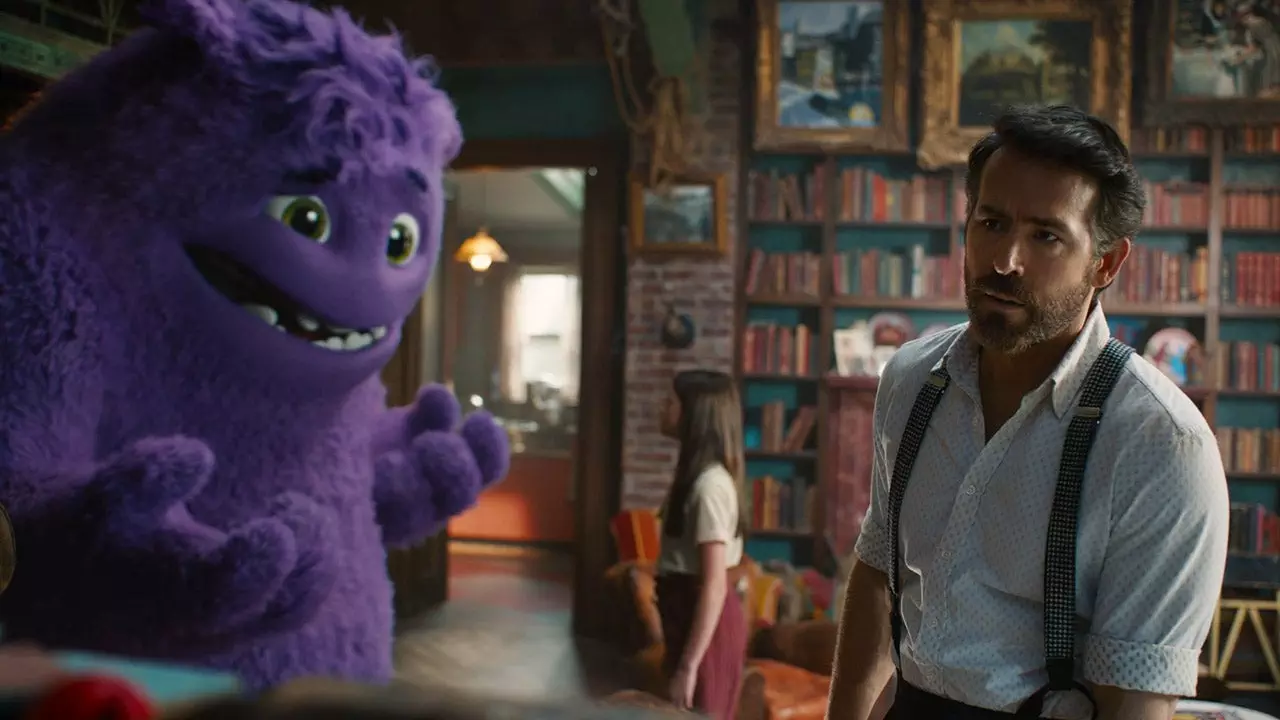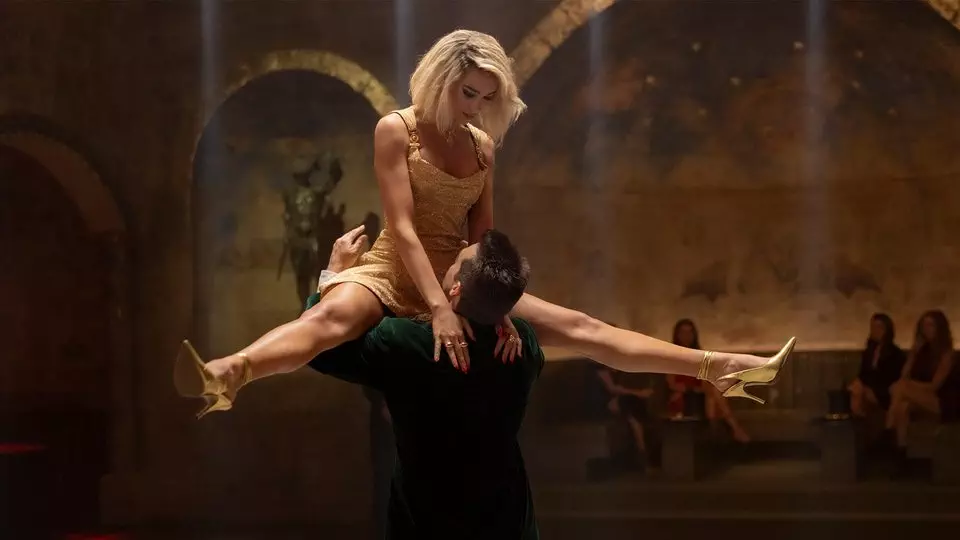World leaders at a G7 conference politely bicker, copulate in the bushes and work on wafty, content-free speeches while a worldwide apocalypse commences — politicians, they’re just like us! — in collaborating Canadian directors Guy Maddin, Evan Johnson and Galen Johnson’s frequently hilarious latest feature.
Although they’ve kept busy with a steady stream of shorts, the trio haven’t made a feature with actors since the fantastical The Forbidden Room from 2015. With a proper beginning, middle and end, and barely any tributes to silent cinema or interactive tricksiness, Rumours may arguably be Maddin’s most conventional film ever, or at least since The Saddest Music in the World (2003). That is, if you can call a film conventional that’s got furiously masturbating bog zombies, a giant brain the size of a hatchback, and an AI chatbot that catfishes pedophiles. All the same, it’s a hoot, even if the energy flags in the middle.
Rumours
The Bottom Line
The last laugh before it all burns down.
Venue: Cannes Film Festival (Special Screening)
Cast: Cate Blanchett, Roy Dupuis, Denis Monochet, Charles Dance, Nikki Amuka-Bird, Rolando Ravello, Takehiro Hira, Alicia Vikander
Directors: Guy Maddin, Evan Johnson, Galen Johnson
Screenwriter: Evan Johnson, based on a story by Guy Maddin, Evan Johnson and Galen Johnson
1 hours 58 minutes
For those who like to keep score on these sort of things, this is also the first film directed by Maddin, let alone brothers Evan and Galen Johnson, that’s been programmed in Cannes’ official selection. Apart from the fact that it’s a welcome rib-tickler that breaks up this year’s festival’s monotonous procession of poverty porn and disappointments by fading auteurs, Rumours’ path to the Croisette was almost certainly smoothed by the presence of major names in the cast including Cate Blanchett, Alicia Vikander, Charles Dance and French star Denis Ménochet (Beau Is Afraid, Peter von Kant). That cast and the festival showcase won’t do any harm to the film’s commercial prospects. Bleecker Street recently announced they’ve acquired the rights for U.S. distribution.
The satire here isn’t necessarily aimed at any specific politician given that the characters are all clearly living in a fictional world, one where ideology barely seems to matter. Nevertheless, there’s a distinct sharpness in the way the script, credited to Evan Johnson but based on a story by all three directors, pokes the bears. Pointedly it lampoons the airy, non-committal language of world summits, the promises that mean nothing, and the outcomes that achieve little in a world that, while admittedly always in crisis, really is on the verge of burning up thanks to climate change.
The film’s most consistent running joke — worked so hard it goes from guffaw-inducing to stale to weirdly suddenly hilarious again, as if through attrition — concerns how seriously the seven world leaders take the process of drafting a joint statement full of platitudes, corporate-speak, psychobabble and song lyrics as they sit in a little woodland gazebo. So absorbed are they in their work, broken up into subgroups like high-schoolers assigned a class project, that they don’t even notice that their aides and servers have all mysteriously disappeared, leaving them alone in the woods.
In other ways, the leaders resemble middle-managers enjoying their annual conference with its catering, photo opportunities and time off from troublesome spouses — a particular concern for Canada’s prime minister Maxime Laplace (The Forbidden Room’s Roy Dupuis, rocking a man bun with an undercut like an aging pop star). Broad hints are dropped that Maxime had a fling with the United Kingdom’s otherwise goal-directed prime minister Cardosa Dewindt (Nikki Amuka-Bird). This year he’s caught the thirsty eye of host-country Germany’s elegant Chancellor Hilda Ortmann (Blanchett, showing off strong comedy chops, even in the way she Germanicizes her vowel sounds).
The United States’ President Edison Wolcott (Charles Dance, slyly self-parodying) is more interested in getting some sleep and keeps nodding off, a gag that may be sheer coincidence but weirdly parallels what’s going on at the minute with Donald Trump at his criminal hush money trial. Another cute gag has the film never explaining why the American president has such a plummy British accent, and the one time he’s about to share why gets interrupted.
Rounding out the democratic world powers, Ménochet’s French President Sylvain Broulez is a grandiloquent blowhard who probably talks more than Japan’s reticent Tatsuro Iwasaki (Takehiro Hira) and Italy’s bumbling beta-male Antonio Lamorte (Rolando Ravello) combined. Both of the latter two, however, are aces as slow burns and understated reaction shots, especially Ravello.
Alicia Vikander, speaking only in her native Swedish for a change, shows up halfway through the film as the president of the European Commission, Celestine Sproul, when Maxime stumbles across her in the woods with the aforementioned giant brain, which you’ll have to watch the film to understand.
Not that understanding is really the point here. Rumours operates on a surrealist plane of its own, making up the rules of its universe as it goes along. Shall we have millennia-old boneless bog people who come to life and menace the guests, it asks itself, and the answer is yes, why not? What if the non-source music swells and bursts like the melodramatic score of a soap opera at times? Sure!
The whole thing sometimes feels like a skit show that just barely holds together until the filmmakers and cast bring it all home for a terrific climactic closure, in which all the buzzwords and banalities get to be rolled up into one triumphant speech shouted into the void as world burns. Like the best comic fantasies, Rumours has more than a grain of tragic truth to it.
Full credits
Cast: Cate Blanchett, Roy Dupuis, Denis Monochet, Charles Dance, Nikki Amuka-Bird, Rolando Ravello, Takehiro Hira, Alicia Vikander, Zlatko Buric, Tomi Kosynus, Ralph Berkin, Alexa Kennedy
Production companies: Buffalo Gal Pictures, Maze Pictures, Square Peg, Thin Stuff Productions, Walking Down Broadway
Directors: Guy Maddin, Evan Johnson, Galen Johnson
Screenwriter: Evan Johnson, based on a story by Guy Maddin, Evan Johnson and Galen Johnson
Producers: Liz Jarvis, Philipp Kreuzer, Lars Knudsen, Guy Maddin, Evan Johnson, Galen Johnson
Executive producers: Ari Aster, Cate Blanchett, Phyllis Laing, Jorg Schulze, Joe Neurauter, Devan Towers, Tyler Campellone, Lina Flint, Mary Aloe, Gillian Hormel, Andrew Karpen, Kent Sanderson, Adrian Love, Michael O’Leary, Stefan Kapelari, Moritz Peters, Blair Ward, Anders Erden, Lauren Case, Eric Harbert, Michael Werry, George Heuser, Jacob Phillips, Stephen Griffiths, Christopher Payne, Dave Bishop, George Hamilton, James Pugh, Janina Vilsmaier, Fred Benenson, Morwin Schmookler, George Rush
Co-producers: Judit Stalter, Simon Ofenloch
Directors of photography: Stefan Ciupek
Production designer: Zosia Mackenzie
Costume designer: Bina Daigeler
Editor: John Gurdebeke, Evan Johnson, Galen Johnson
Music: Kristian Eidnes Andersen
Music supervisor: Jillian Ennis
Casting: Avy Kaufman
Sales: Protagonist Pictures
1 hours 58 minutes
THR Newsletters
Sign up for THR news straight to your inbox every day
Subscribe
Sign Up


.jpg)






























